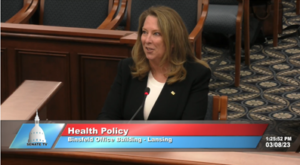
The MHA released another episode of the MiCare Champion Cast, which features interviews with healthcare policy experts in Michigan on key issues that impact healthcare and the health of communities.

On episode 30, State Representative Julie Rogers (D-Kalamazoo) and Laura Appel, executive vice president of government relations and public policy at the MHA, discuss current health policy priorities impacting Michigan hospitals, patients and communities. The episode is available to steam on Spotify, YouTube, Apple Podcasts and SoundCloud.
Rep. Rogers is serving her second term representing Michigan’s 41st House District, which includes portions of Kalamazoo, Portage and Comstock township. She’s a practicing physical therapist and a champion of public health, previously serving on the National Association of Counties Health Steering Committee for seven years and now as chair of House Committee on Health Policy. Rogers also serves as a member of many committees within the house and co-chairs the Biosciences Legislative Caucus.
Throughout the episode, Rogers and Appel cover the impact health policy has had on issues like Michigan’s Medicaid work requirements within the Healthy Michigan Plan, preventative health, auto no-fault, ongoing workforce shortages, and more.
“We have about 208,000 people who work in our hospitals,” notes Appel. “We need another 27,000 more…nearly 8,500 nurses. We’re short over 4,000 technicians – the people who help out in the pharmacy, lab technicians, patient care techs – we also need people who contribute to operations.”
Those interested in learning more about how to get involved in healthcare advocacy or how to engage with local lawmakers on issues such as nurse staffing, 340B, auto no-fault, etc. can visit the issues and advocacy webpage and/or the MHA Legislative Action Center. Those looking to pursue a career in healthcare are encouraged to visit the Hospital Careers website.
The MiCare Champion Cast is part of the statewide #MiCareMatters campaign, launched in 2017, which aims to build a network of citizens — “MiCare Champions” — who will be called upon to engage in advocacy efforts to protect access to affordable healthcare services in Michigan.
Members with questions or who would like to submit ideas for future podcasts should contact Lucy Ciaramitaro at the MHA.


